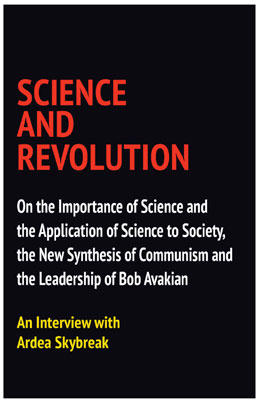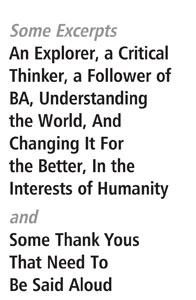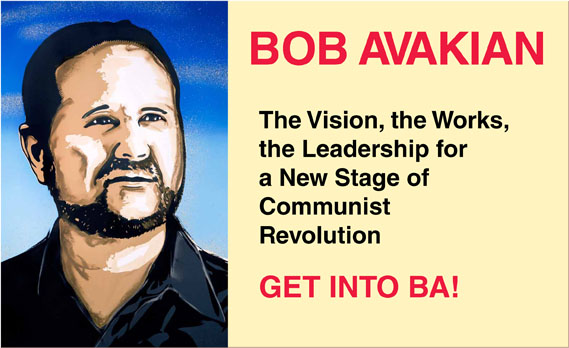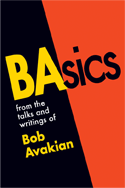Digging into the New Synthesis Outline with a Large, Diverse Group of People
January 4, 2016 | Revolution Newspaper | revcom.us
From a reader:
THE NEW SYNTHESIS OF COMMUNISM: FUNDAMENTAL ORIENTATION, METHOD AND APPROACH, AND CORE ELEMENTS
by Bob Avakian, Chairman,
Revolutionary Communist Party, USA, Summer 2015
We held three salons in this area on The New Synthesis of Communism: Fundamental Orientation, Method and Approach, and Core Elements by Bob Avakian (the outline). This correspondence is mainly on the first two.
The salons were large (we broke into two groups in the final salon) and included people with various levels of understanding. They were attended by a mixture of veterans, Revolution Club members, a few veteran comrades, and new and newer people, some of whom were current university students or recent graduates. We decided to focus mainly on digging into, engaging, and struggling over some of the key points in the outline rather than trying to “cover all the points,” as the way to open up the engagement with BA and the new synthesis. Digging into these basic points, and speaking to the thinking/questions of the newer people, was engaging and challenging for everyone involved.
We began this first salon with BA’s “Introductory Point of Orientation” and the “Method and Approach: Communism as a Science—Further Development of Dialectical Materialism,” the first point in that section on freedom and necessity.
Everyone spoke, and overall people were very stimulated and engaged, including by being in a group with a bunch of different people and hearing different views. People thought it was very exciting and important to take the time to dig into basic, foundational questions, not mainly practical tasks, etc., which a number of people said they did not get the chance to do normally or in the course of doing political work/working on the mass initiatives. People expressed a real interest in digging into BA and the new synthesis further, although we have to make sure that happens, as the sessions also revealed much more work and struggle to be done.
The importance of the new synthesis in terms of not just what people think, but how they think, really stood out. People are not used to thinking about how they think, what their method and approach are, what is scientific, what truth is, what theory is, instead they’re used to thinking phenomenally.
On the question of science, people were eager to dig into this and got the point that it is about reality, and has to be systematic, and evidence based, and not just apply to one person or situation but more universally, and that it has to be provable or repeatable. This was an important beginning, and it was a positive thing that people were trying to draw on and apply this to all the questions we were discussing.
Many of the newer people were influenced by relativism and identity politics, which came out in the form of the role and importance of “lived experience.” People could more readily see that we had to be for all humanity rather than a single group, than they could the scientific question—that there is one objective reality, science is about getting to that, and that you can’t change the world unless you proceed from that method and approach. Also, people, again including some comrades and those around us for a long time, were much more able to criticize populism than populist epistemology, in particular how this has been a problem in the communist movement and our own thinking. Things got more sharpened up around populist epistemology, more than relativism overall, and there was contestation about relativism which needs further sharpening up. People’s mode of thinking is phenomenal; they’re able to criticize populism but not that mode of thought or to examine their own mode of thinking.
Some of the newer people also tended to proceed from the mass initiatives—not revolution and communism—including that the initiatives were a key part of the strategy for revolution. And none of these newer people seemed clear on actual revolution, which was also apparent in the discussion of the strategic approach to revolution, and what communist consciousness means (lot of emphasis on it being scientific, but detached from/not specifically connected to actually making revolution). One new person articulated a different line—more improving things for everyone—and it definitely impacted her view of what methodology is required. Afterward one veteran remarked that the sessions made him think about how buried we are in the day-to-day struggle and how important it is to step back and see the bigger picture.
What Is Science?
People were excited to get into what is science. The general understanding that emerged was along the lines leaning toward positivism—that you have to have evidence, collect data, it must be testable, reproducible, universal, and internally consistent. Someone raised the issue of “lived experience,” which we also got into in our second session. Others objected. One student argued that lived experience is not the only way to measure the truth—the criteria is internally consistent, logical, repeatable, and applicable to everyone, and as another person put it, science “brings us together.”
Later and in other sessions, I raised that science first and foremost has to reflect objective reality, including internal contradictions, development, motion, the leap to synthesis, and conceptual knowledge.
Other issues that came up that we weren’t able to pursue: science has been used against the people, and it can be going toward an agenda. (We didn’t fully get into the relationship between scientific and partisan—or “agendas.”) A student raised: “I have a problem with social science. Also we don’t know yet if god exists or not; there’s no evidence to prove god doesn’t exist.” A recent graduate said: “That’s not my major [science], but now seeing how science can be applied to everyday life, and the system is set up so we’re not trained to be scientists.” We got into this a bit, could have much more.
Dialectical Materialism
This was a new concept to many people who were digging into the science of communism for the first time. So I had to do some background. Dialectics and materialism represent a huge leap in human understanding that went against thousands of years of idealism and metaphysics (matter as unchanging “billiard balls”) by Marx, who applied it to history and society. The goal of communism is based on this and scientifically determined—comes out of scientific analysis of how society is organized, what’s essence of society, how it has changed and how there is now a basis to end oppression. It’s not easy to be scientific, and BA has made those breakthroughs. I referred to BAsics 4:4.
The New Synthesis
There was confusion and different lines over whether the key here was that the new synthesis represented a leap and foundation for a whole new world. One person said that it’s a work in progress, and that tells you things could change in the future. Another said: “I don’t know the old synthesis, so how can I evaluate the new one?” A veteran comrade made an important point: you have to get into the substance, you have to look at the previous stage of communist revolution—what are the lessons learned; is what’s learned adequate to the task of preparing for revolution and getting to the 4 Alls; is the new synthesis a significant rupture with even the best of communist movement prior; do these constitute a radical and necessary rupture. This outline is a clearer guide to answering those questions in the affirmative.
Freedom and Necessity
We read BA’s statement on freedom and necessity (quoted at the beginning of Ardea Skybreak’s book Of Primeval Steps & Future Leaps and discussed in the film BA Speaks: REVOLUTION—NOTHING LESS! and in “Ajith—A Portrait of the Residue of the Past,” in Demarcations #4) and cited this as a crucial way BA has further developed dialectical materialism and the science of communism. The newer people especially had not heard or thought about this, so we had to explain some basic terms—necessity, freedom, etc. (a number of people raised the need for a definition of terms).
A veteran comrade talked about how “inevitablism” (the idea that the achievement of communism is inevitable) means there’s no (or less) role for consciousness, as if people will pick up the science on their own, and this negates the role of the party. But people had a harder time with the deeper issue spoken to in the quote—the dialectic between causality and accident and the many layers of reality (and then yes, “inevitabilism” would undercut the fight for scientific probing of reality on all its levels).
A university student raised she was confused about constraint and freedom, but said something like “communism is not freedom”—that communism has a tendency to dictatorship, a lot feel communism is dictatorship.
So much was raised and we were not able to dig into so many things, including the statement about communism. People were anxious to get together again to get further into the new synthesis and challenge themselves further. A number of people continued the discussion that day and the next.
Session Two
To begin the second session, I briefly returned to why we’re digging into this outline and BA’s new synthesis: There are crises and cracks in the wall in this system, which is a horror; BA’s new synthesis is a revolution in human thought and represents a coherent foundation for a new stage of communism; the possibility of making an actual revolution and forging a new communist world has been greatly heightened as a direct result of the new synthesis of communism—it’s what people DON’T know about and urgently need to know—there’s a way out and a leadership to lead us out! We are wrestling with theory here—why? Because without revolutionary theory—theory based on a consistently scientific method and approach, and in particular the scientific method and approach of dialectical materialism—and without this theory being taken up and applied by growing numbers of people, there can be no emancipating revolution, and the horrendous outrages and abuses to which the masses of humanity are continually subjected will go on—and on. And I directed people to read or re-read “‘If you are serious...’ An Invitation to Learn About—and Change—the World” from revcom.us.
I then recapped and deepened a couple of points from the last discussion: Science isn’t just the systematic collection of evidence, it’s also making the leap to understanding how things work, how they came to be, the contradictions within and driving something, how it can be changed, how it interacts with other things (drawing from the interview with Ardea Skybreak). And how confronting this “necessity”—i.e., reality and what you’re up against—is the basis for grasping freedom, i.e., the ability to work on and transform that reality. Confronting reality as it actually is sounds like a simple thing, but it’s not. There are furious arguments against doing that, including in the communist movement—many ways people don’t—it’s not automatic or natural and this means science and the scientific method further developed by BA.
The first question (What is a scientific theory of knowledge, and what is relativism?) sparked a lot of discussion about people’s views of abortion and women’s rights (one person initially asked whether men have anything to say about abortion) and more generally the politics and morality of different issues, but it was more difficult for people to get to the epistemological issues. For example, one young man said, “It’s not murder, but in the antis’ minds they equate that with murder; I don’t see that.” I asked, “How do you know?” “That’s what I believe: woman’s right to do what she wants.” A young woman jumped in. She said, “It’s not scientific. A woman has to give birth to a fetus, but if there is no birth, it is not a baby.”
This got us back to a discussion of what science is and how it’s different than relativism. Some again had a more linear or positivist view: a university student again argued that science is internally consistent, proven by experiment, and true to everyone. A recent graduate added that: “Truth and science is to give up all emotion; it’s truth for everyone, and reality is out there regardless of what people think or experience.” Another: “Just because you say it’s true doesn’t make it a fact. If a tree falls in the forest, it still makes a sound [this example I heard a number of times]; if everyone had their own reality, we wouldn’t get anywhere.” And another student: “Humans are part of the objective world. Ideas flow from that and are part of that objective reality, but they don’t determine what is the objective world—e.g., the Sun does not go around the Earth.”
It was pointed out that “objective” means independent of all perceptions. But the question of whether there’s one objective reality was still contested: The young man said: “There are many realities—there’s lived experienced, there’s objective reality... but lived experience colors what your reality is, as in you haven’t gone through what I’ve gone through.” People wrestled with this in terms of its political implications. A university student said: “The hidden assumption of identity politics is you’re fighting for a certain group of people—we’re not fighting for a certain group of people but humanity.”
On populist epistemology and whether the oppressed have a special purchase on the truth, some people raised there can be good populism—in the sense of something we’re fighting for becomes popular. In speaking against populism, a university student raised the example of the oppressed voting for Nazis. She then connected populism and religiosity. She argued that in previous movements in Russia and China, the leaders were far beyond their contemporaries, who were often illiterate and couldn’t understand. So to promote their ideas, there had to be a dictatorship and to maintain that dictatorship they made their leaders gods or idols. She asked, “Is there another way to promote the idea without making it religious?”
I thought this would take us in the direction of getting into a long discussion of the first wave of communist revolution, which I feared could have taken us off track—but I did want to set the record straight. The point of dictatorship of the proletariat is to move toward communism. Mao broke ground in addressing the contradiction being posed and worked on narrowing the gap. The university student countered that the way Mao and others did that was to promote the Red Book in a way that made Mao a god. I responded that no, that wasn’t Mao’s outlook or what the Cultural Revolution in China was about. At the same time, BA has further advanced the understanding of how to narrow this gap between the leadership and the led. All this was worth real digging and interrogation. In thinking about this exchange now, I think maybe it would have been worth going there in the sense that the whole emphasis in the new synthesis on training people how to think is precisely to narrow this real gap and the opposite of promoting a religious view of leadership.
One person, older in years but newer to revolution and BA, said that being part of an oppressed group doesn’t mean you have all the answers—perhaps insight into life experiences, but it is not difficult for anyone to research or see reality, whether oppressed or not. One recent graduate was still grappling with all this. She said, “Populism and populist epistemology: yes and no. Some who are oppressed come out as revolutionaries and some don’t. It’s hard to get the whole big picture, but there are different narratives and perspectives and always will be, but we need to come to an understanding that we can all agree on.”
We went back to why is this epistemology crucial. A Revolution Club leader said, “If there is no way to understand what is true, you default to who is the most powerful guy around. Without science the only other option is conventional wisdom.” A young man said, “When I said before that people have different realities, I meant points of view. But there is an overarching objective reality on top of that. It makes sense, this BAsics quote (4:10), but I can’t express it. If reality and truth are not objective, the ones with more resources and money will get their say.”
The issue of one reality is still at issue—is reality all-encompassing and objective, or is it what people think? Can you apply science to human society? All of this is related to people being victims of deceit and self-deceit until they see class interests behind things—but also related to taking up the method of looking at the world scientifically regardless of what people think and not caught up in narratives.
Volunteers Needed... for revcom.us and Revolution
If you like this article, subscribe, donate to and sustain Revolution newspaper.




 For humanity to advance beyond a state in which "might makes right"—and where things ultimately come down to raw power relations—will require, as a fundamental element in this advance, an approach to understanding things (an epistemology) which recognizes that reality and truth are objective and do not vary in accordance with, nor depend on, different "narratives" and how much "authority" an idea (or "narrative") may have behind it, or how much power and force can be wielded on behalf of any particular idea or "narrative," at any given point.
For humanity to advance beyond a state in which "might makes right"—and where things ultimately come down to raw power relations—will require, as a fundamental element in this advance, an approach to understanding things (an epistemology) which recognizes that reality and truth are objective and do not vary in accordance with, nor depend on, different "narratives" and how much "authority" an idea (or "narrative") may have behind it, or how much power and force can be wielded on behalf of any particular idea or "narrative," at any given point.





